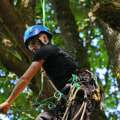The knowledge gained with this certification can improve the productivity, quality of care and safety practices of those who earn the credential. As you can see, it means a lot when we talk about having ISA-certified arborists. They are, by definition, the best people you can have working on your plants and trees. A certified arborist is a person who is trained in the art and science of planting and maintaining individual trees.
International Arboricultural Society certified arboriculture growers have a minimum of three years of full-time experience working in the professional tree care industry, follow a code of ethics to ensure the reliability of their work, and have passed an arboriculture exam or have a degree in arboriculture, forestry, landscape architecture or horticulture. Obtaining certification demonstrates that the arborist is an expert and experienced tree care professional. Becoming an ISA certified arborist is a voluntary process through which people can measure their knowledge and competencies needed to provide proper tree care. ISA certification is not sponsored or endorsed by the government.
It is managed by the International Arboricultural Society as a way for tree care professionals to demonstrate their commitment to the profession and industry. Certified arborists earn CEU by attending seminars, studying in university courses, or completing studies in journals and books published by the ISA. The certification is valid for three years, during which the arborist must complete 30 units of continuing education (CEU) to re-certify. Certification can attest to a person's knowledge of the tree, but it cannot guarantee or guarantee quality performance.
The process of obtaining ISA-certified arborist credentials is long and truly marks someone as skilled and knowledgeable in all aspects of tree care. The distinction between an ISA-certified arborist and an arborist or other person who calls themselves a “tree expert” is important and a topic worth delving into if you want to better understand what differentiates them. To begin seeking ISA certification, your arborist must provide documented evidence that you have worked, treated and maintained trees full-time for at least three years or more. The ISA Code of Ethics sets expectations for ISA-certified arboriculturists to practice safe work habits, act professionally and, above all, perform best arboriculture practices at all times.
However, calling yourself a professional arborist does not automatically mean that you have received the ISA certification. Since tree care can be a hazardous job, you also won't know if your tree surgeon has received proper training in safety procedures, unless you can prove that you are also an ISA-certified arborist. Arborists must maintain their certification by completing 30 continuing education units (CEUs) in that time. Arboriculture is the study of tree biology, so it makes sense for the ISA to be an organization dedicated to tree care.
If you want the best for your trees and garden, you should work with certified tree experts dedicated to getting the job done right and caring for your trees in a professional and experienced manner.






